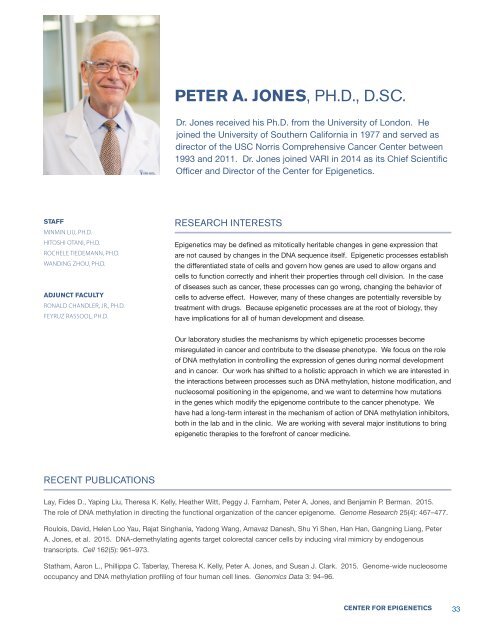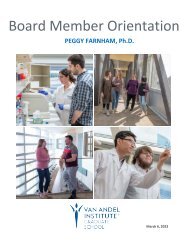2016 Scientific Report
Create successful ePaper yourself
Turn your PDF publications into a flip-book with our unique Google optimized e-Paper software.
PETER A. JONES, PH.D., D.SC.<br />
Dr. Jones received his Ph.D. from the University of London. He<br />
joined the University of Southern California in 1977 and served as<br />
director of the USC Norris Comprehensive Cancer Center between<br />
1993 and 2011. Dr. Jones joined VARI in 2014 as its Chief <strong>Scientific</strong><br />
Officer and Director of the Center for Epigenetics.<br />
STAFF<br />
MINMIN LIU, PH.D.<br />
HITOSHI OTANI, PH.D.<br />
ROCHELE TIEDEMANN, PH.D.<br />
WANDING ZHOU, PH.D.<br />
ADJUNCT FACULTY<br />
RONALD CHANDLER, JR., PH.D.<br />
FEYRUZ RASSOOL, PH.D.<br />
RESEARCH INTERESTS<br />
Epigenetics may be defined as mitotically heritable changes in gene expression that<br />
are not caused by changes in the DNA sequence itself. Epigenetic processes establish<br />
the differentiated state of cells and govern how genes are used to allow organs and<br />
cells to function correctly and inherit their properties through cell division. In the case<br />
of diseases such as cancer, these processes can go wrong, changing the behavior of<br />
cells to adverse effect. However, many of these changes are potentially reversible by<br />
treatment with drugs. Because epigenetic processes are at the root of biology, they<br />
have implications for all of human development and disease.<br />
Our laboratory studies the mechanisms by which epigenetic processes become<br />
misregulated in cancer and contribute to the disease phenotype. We focus on the role<br />
of DNA methylation in controlling the expression of genes during normal development<br />
and in cancer. Our work has shifted to a holistic approach in which we are interested in<br />
the interactions between processes such as DNA methylation, histone modification, and<br />
nucleosomal positioning in the epigenome, and we want to determine how mutations<br />
in the genes which modify the epigenome contribute to the cancer phenotype. We<br />
have had a long-term interest in the mechanism of action of DNA methylation inhibitors,<br />
both in the lab and in the clinic. We are working with several major institutions to bring<br />
epigenetic therapies to the forefront of cancer medicine.<br />
RECENT PUBLICATIONS<br />
Lay, Fides D., Yaping Liu, Theresa K. Kelly, Heather Witt, Peggy J. Farnham, Peter A. Jones, and Benjamin P. Berman. 2015.<br />
The role of DNA methylation in directing the functional organization of the cancer epigenome. Genome Research 25(4): 467–477.<br />
Roulois, David, Helen Loo Yau, Rajat Singhania, Yadong Wang, Amavaz Danesh, Shu Yi Shen, Han Han, Gangning Liang, Peter<br />
A. Jones, et al. 2015. DNA-demethylating agents target colorectal cancer cells by inducing viral mimicry by endogenous<br />
transcripts. Cell 162(5): 961–973.<br />
Statham, Aaron L., Phillippa C. Taberlay, Theresa K. Kelly, Peter A. Jones, and Susan J. Clark. 2015. Genome-wide nucleosome<br />
occupancy and DNA methylation profiling of four human cell lines. Genomics Data 3: 94–96.<br />
CENTER FOR EPIGENETICS 33

















